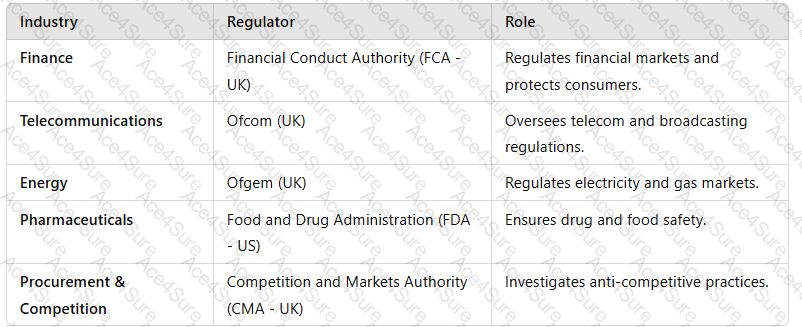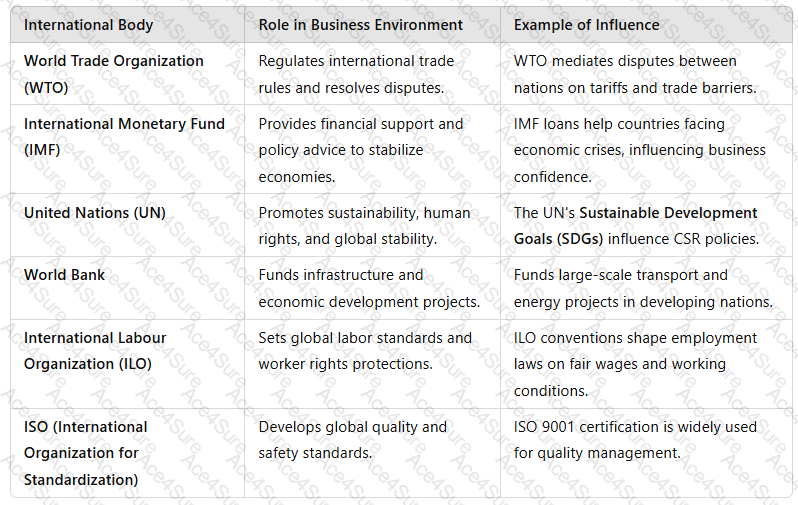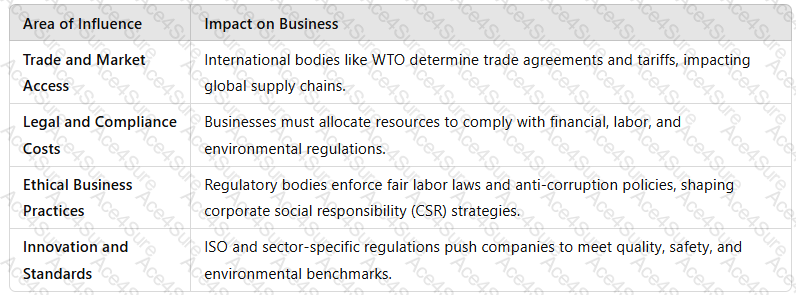The Role and Influence of Industry Regulators and International Bodies in the Business Environment
Introduction
Industry regulators and international bodies play acritical role in shaping the business environmentby enforcing regulations, setting industry standards, and ensuring fair competition. These organizations influence how businesses operate, impacting areas such astrade, finance, environmental sustainability, labor practices, and consumer protection.
Companies must comply with regulations set by bothdomestic industry regulatorsandglobal institutionsto maintain legal and ethical business operations.
1. Role of Industry Regulators
Industry regulators aregovernment-appointed or independent organizationsthat oversee specific sectors to ensure compliance with laws and standards. Their key functions include:
✅Enforcing Compliance– Ensuring companies adhere to legal requirements (e.g., financial reporting, safety regulations).✅Promoting Fair Competition– Preventing monopolies and anti-competitive practices.✅Consumer Protection– Safeguarding consumer rights and ensuring product/service quality.✅Regulating Market Entry and Operations– Setting standards for licensing, pricing, and ethical conduct.
????Example of Industry Regulators
 A screenshot of a computer
Description automatically generated
A screenshot of a computer
Description automatically generated
Case Example:TheUK’s Competition and Markets Authority (CMA)blockedMicrosoft’s acquisition of Activision Blizzarddue to concerns over market dominance in cloud gaming.
2. Role of International Bodies
International bodies setglobal regulations, trade policies, and ethical standardsthat influence businesses operating across borders.
 A table with text on it
Description automatically generated
A table with text on it
Description automatically generated
Case Example:TheWTO’s intervention in Brexit trade negotiationsaffected tariffs and supply chain costs for UK-based companies.
3. Influence of Industry Regulators and International Bodies on Business Strategy
Businesses must align their strategies with regulatory and international frameworks toensure compliance and avoid financial or reputational risks.
 A screenshot of a computer
Description automatically generated
A screenshot of a computer
Description automatically generated
Example:TheEU’s General Data Protection Regulation (GDPR)forced global companies to enhancedata protection policiesor face heavy fines.
4. Advantages and Disadvantages of Regulatory and International Influence
✅Advantages
Promotes Stability & Fair Competition– Reduces market manipulation and corruption.
Protects Consumers & Employees– Ensures safety, fair wages, and ethical standards.
Encourages Innovation & Sustainability– Businesses invest in R&D to meet regulatory requirements.
Facilitates Global Trade– International trade agreements create business opportunities.
❌Disadvantages
Regulatory Burdens & Compliance Costs– Strict laws increase operational costs.
Trade Barriers & Bureaucracy– Lengthy regulatory approval processes slow down market entry.
Risk of Overregulation– Too many rules can stifle competition and innovation.
????Example:TheEU Emissions Trading System (EU ETS)requires manufacturers topay for carbon emissions, increasing operational costs.
Conclusion
Industry regulators and international bodiesshape the business environmentby enforcing laws, ensuring ethical practices, and facilitating global trade. Companies must proactivelymonitor regulatory changes, integrate compliance into strategic planning, and adapt to international standardsto maintain market competitiveness and sustainability.